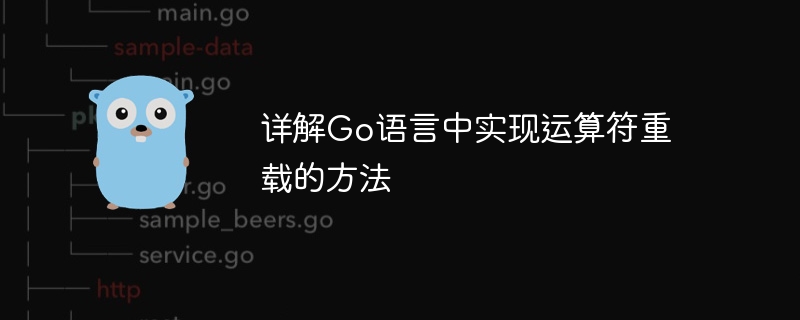Home >Backend Development >Golang >How to implement operator overloading in Go language
How to implement operator overloading in Go language
- WBOYWBOYWBOYWBOYWBOYWBOYWBOYWBOYWBOYWBOYWBOYWBOYWBOriginal
- 2024-02-19 17:05:231222browse

Go language is a programming language known for its simplicity, efficiency and power. It does not support operator overloading. Operator overloading means that when performing operations on user-defined data types, operators can be overloaded to achieve corresponding functions. In the Go language, although direct operator overloading is not supported, we can achieve similar functionality by defining methods.
To achieve functions similar to operator overloading, you can use the interfaces and methods of the Go language. Interfaces are used to define behavior, while methods are used to implement specific types of behavior. Next, I will introduce in detail how to achieve the effect of operator overloading through interfaces and methods.
First, we define an interface to represent the data type that needs to implement operator overloading:
type Operator interface {
Add(other Operator) Operator
// 定义其他运算符方法,如Subtract、Multiply、Divide等
}Interface Operator contains the Add method, indicating that the type that implements the interface can be Addition operation. To implement operator overloading, we only need to implement the interface in a specific data type and define the corresponding method. The following takes a complex type as an example to illustrate:
type Complex struct {
Real float64
Imaginary float64
}
func (c Complex) Add(other Operator) Operator {
otherComplex := other.(Complex)
return Complex{
Real: c.Real + otherComplex.Real,
Imaginary: c.Imaginary + otherComplex.Imaginary,
}
}
// 定义其他相应运算符方法 In the above code, we define a complex type Complex and implement the Add method of the Operator interface . In the Add method, we type-convert another Complex object and implement the addition of complex numbers.
Through the above method, we can implement functions similar to operator overloading, so that complex number types support addition operations. We can also define other operator methods according to actual needs, such as subtraction, multiplication, division, etc.
It should be noted that although the Go language does not support direct operator overloading, similar effects can be achieved through the combination of interfaces and methods. Although the implementation of this method is relatively troublesome, it has high flexibility and readability, and is in line with the design ideas of the Go language.
In summary, although the Go language itself does not support operator overloading, similar functions can be achieved through interfaces and methods. Developers can design corresponding interfaces and methods based on actual needs to implement custom type operator overloading functions. This approach can not only keep the code simple and readable, but also meet specific business needs.
The above is the detailed content of How to implement operator overloading in Go language. For more information, please follow other related articles on the PHP Chinese website!

